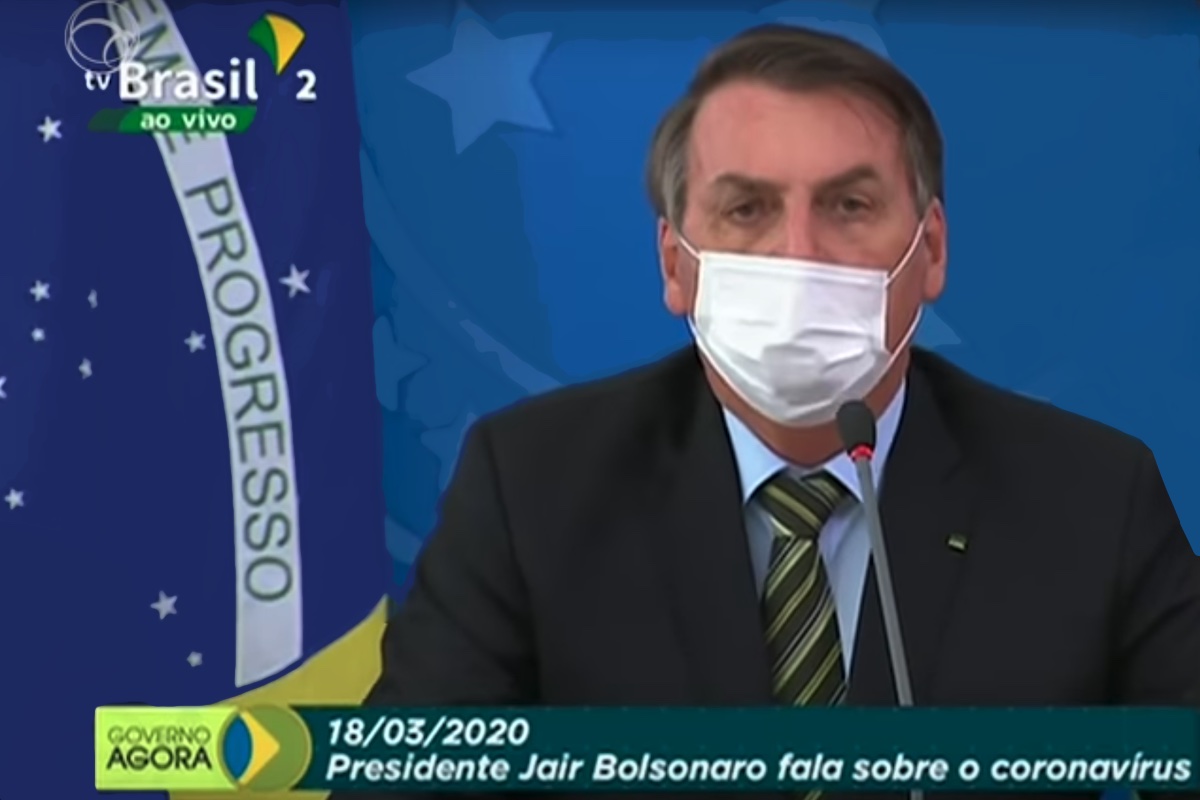Top Stories
As Brazil Confronts Coronavirus, Bolsonaro and His Supporters Peddle Fake News
When thousands of people took to the streets anyway, the president himself shared videos of the demonstrations, even though he’d recommended their suspension.

On March 11th, when the global community already had been struggling to contain the spread of coronavirus for many weeks, Brazilian President Jair Bolsonaro declared that the outbreak was something “of a fantasy.” It was a “moment of crisis,” he acknowledged, but “a small crisis” that had been exaggerated by “mainstream” media.
“Some press outlets had managed to make oil prices fall,” he added. “[It’s] a stock-market problem. It happens occasionally.”
These comments echoed the views of Bolsonaro’s most enthusiastic right-wing supporters, who have spent recent days disseminating articles and social-media posts downplaying the virus as mere hysteria—perhaps even part of an organized campaign created by the media, NGOs, and communists.
A blogger with ties to Brazil’s far-right government, Bernardo Küster, wrote that the situation was “in the first place, a great psychological experiment of manipulation on a global scale… Why not start tests to manipulate the international market by fear and [appealing to] our survival instincts?” Küster added that the template for this sort of campaign had already been witnessed on “a global scale in [the field of] education, through UNESCO”—a cryptic reference that he annotated vaguely by reference to right-wing author Pascal Bernardin, who has argued that the world is sliding into left-wing “totalitarian government.”
David Magalhães, International Relations professor at the Pontifical Catholic University of São Paulo, has noted that some of Küster’s claims—such as that the Chinese government spread the coronavirus to eliminate opposition to communism—are copied straight from Donald Trump’s former chief strategist, Stephen K. Bannon: “It’s just ctrl-c [and] ctrl-v. [In Brazil, as] throughout the world, the radical right is deliberately waging a war of narratives to discredit institutions that they judge elitist/progressive. The media, academics and scientists are prime targets.”
O @bernardopkuster diz que o gov chinês espalhou o coronavirus para eliminar a oposição ao comunismo chinês (vírus detecta ideologia?). E de onde ele foi buscar esse delírio? Previsivel: Bannon. Não ha nada de autêntico no bolsolavismo. É só ctrl c + ctrl v. pic.twitter.com/i0Owq42Rc5
— David Magalhães (@davidmagalhaes) January 27, 2020
Küster is one of the most influential spokesmen for the ideology that some call Bolsolavismo, a mix of right-wing thinking and conspiracism linked to eccentric astrologer, self-styled philosopher and Bolsonaro confidante Olavo de Carvalho. Odilon Caldeira Neto, a historian at the Federal University of Juiz de Fora, notes that there is a strong element within such far-right Brazilian networks that focus on China, with Beijing playing the role of both eastern antagonist to the West more generally, and a source of communist agitation more specifically. According to Küster, for instance, “Covid-19 came at a good time for the Chinese and for the globalist bureaucra[cy]. The U.S. economy is growing… and Trump [likely will be] re-elected. He was winning the trade war against the Red Dragon, which was about to collapse. Trump and his allies continue to undermine globalism.”
More recently, Bolsonaro has changed course, claiming on a Facebook video broadcast that the disease is a “calamity.” But he did so while seated with his colleagues, in defiance of social-distancing practices—this following his insistence on shaking hands with supporters at a rally. The president, wearing a mask, asked that political marches be cancelled due to the same pandemic that a few days earlier he’d called a “fantasy.” Hours later, the marches were indeed called off, though by that time, far-right activists were determined to flout the restrictions as an act of defiance. And Carvalho, the aforementioned right-wing political guru, continued to call for demonstrations (from his home in Virginia) without any concern for the health of his own followers. The hashtag #Desculpepresidentemaseuvou (Sorry president, but I’ll go) began trending.
Alexandre Garcia, a supporter of Bolsonaro and a former journalist with Rede Globo, Brazil’s largest TV network, wrote an op-ed for Gazeta do Povo dismissing fears over coronavirus as a “hypochondriac thing.” He also tweeted on March 9th that “the coronavirus [channels] Freud on [Studies on] Hysteria and The Psychopathology of Everyday Life… and Shakespeare [on] Much Ado About Nothing.” Xico Graziano, a former state representative who supports Bolsonaro, tweeted early on that the epidemic “is the invention of catastrophic journalism.”

Bolsonaro, Brazil’s president since January 2019, is a populist social conservative who often is compared with Donald Trump. His supporters constantly speak out against initiatives aimed at furthering education, supporting teachers, or promoting science. Many of his most vocal cadres range from fundamentalist creationists to monarchists to neo-Nazis. They have raised fake news to an art form. The video network Terça Livre recently released a video in which a commentator speaks about the need to maintain street protests in order to fight the “power of coronavirus”—and urged followers to rise up in case the shadowy forces promoting fears of coronavirus “come to screw the population.”
As of Friday, Brazil already had more than 600 confirmed coronavirus cases (including six deaths), almost 200 of which were reported in the most recent 24-hour period. Ironically, Bolsonaro himself may have been put at risk of coronavirus infection by one of his own advisors. (Numerous members of Bolsonaro’s entourage who visited the United States last week have reportedly tested positive for coronavirus.) The close proximity of the disease is the likely explanation for why Bolsonaro stopped talking about the pandemic as a Chinese hoax. But his prescriptions are superficial. As pointed out by journalist Filipe Barini, “Bolsonaro ended his [March 12th Facebook] speech with only one recommendation: Avoid [social groups]. He did not announce practical measure[s]… He reinforced his support for acts against [political opponents in Brazil’s] Supreme Court and Congress, but asked the organizers to ‘rethink’ their organization [i.e. street marches].”
When thousands of people took to the streets anyway, the president himself shared videos of the demonstrations, even though he’d recommended their suspension. Some wore masks. Others said that the virus was fake. In São Luís, capital of Maranhão state, a demonstrator claimed that “coronavirus has never killed a person on the face of the earth. Nor it will. Old people die because they have pneumonia and other things.”
It was a few days later when Bolsonaro, who was supposed to be in isolation, waiting for the results of a coronavirus test, greeted protestors in Brasília and shook hands with some of them. Afterwards, when interviewed by CNN Brasil, Bolsonaro again suggested that coronavirus fears might be akin to “hysteria,” which he attributed vaguely to “economic interests.” A far-right (largely fake) news outlet celebrated all this by concluding that coronavirus isn’t “holding anyone at home.”
After telling @FoxNews that his father had a preliminary POSITIVE test for coronavirus, Eduardo Bolsonaro now tells @FoxNews the test was NEGATIVE. Bolsonaro says has been in touch with the White House.
— John Roberts (@johnrobertsFox) March 13, 2020
Bolsonaro’s own son, Eduardo Bolsonaro, told Fox News a week ago that his father had tested positive for coronavirus. But hours later, he retracted his statement. Indeed, he even went so far as to say that he hadn’t even spoken to the press about a possible positive result. Jair Bolsonaro then tweeted, moments later, that he had tested negative. This was accompanied by a picture of the president of South America’s biggest country giving a “banana” to journalists. In Brazil, the sign has the same effect as telling someone to go fuck oneself.
- HFA/SABIN atestam negativo para o COVID-19 o Sr. Pres. da República Jair Bolsonaro. pic.twitter.com/iL3YPGPGXA
— Jair M. Bolsonaro (@jairbolsonaro) March 13, 2020
The whole world is facing a pandemic. Right now, Europe is getting the worst of it. But ultimately, the effects could be most serious in countries such as Brazil, which are relatively poor, full of inequality and beset by an ongoing economic crisis—not to mention a political crisis that long predates coronavirus, and which is presided over by a government that often seems sympathetic to radicals and conspiracy theorists.
Fighting coronavirus will require the best global leaders to step up and show real leadership. Alas for Brazil, all we have is Jair Bolsonaro.






